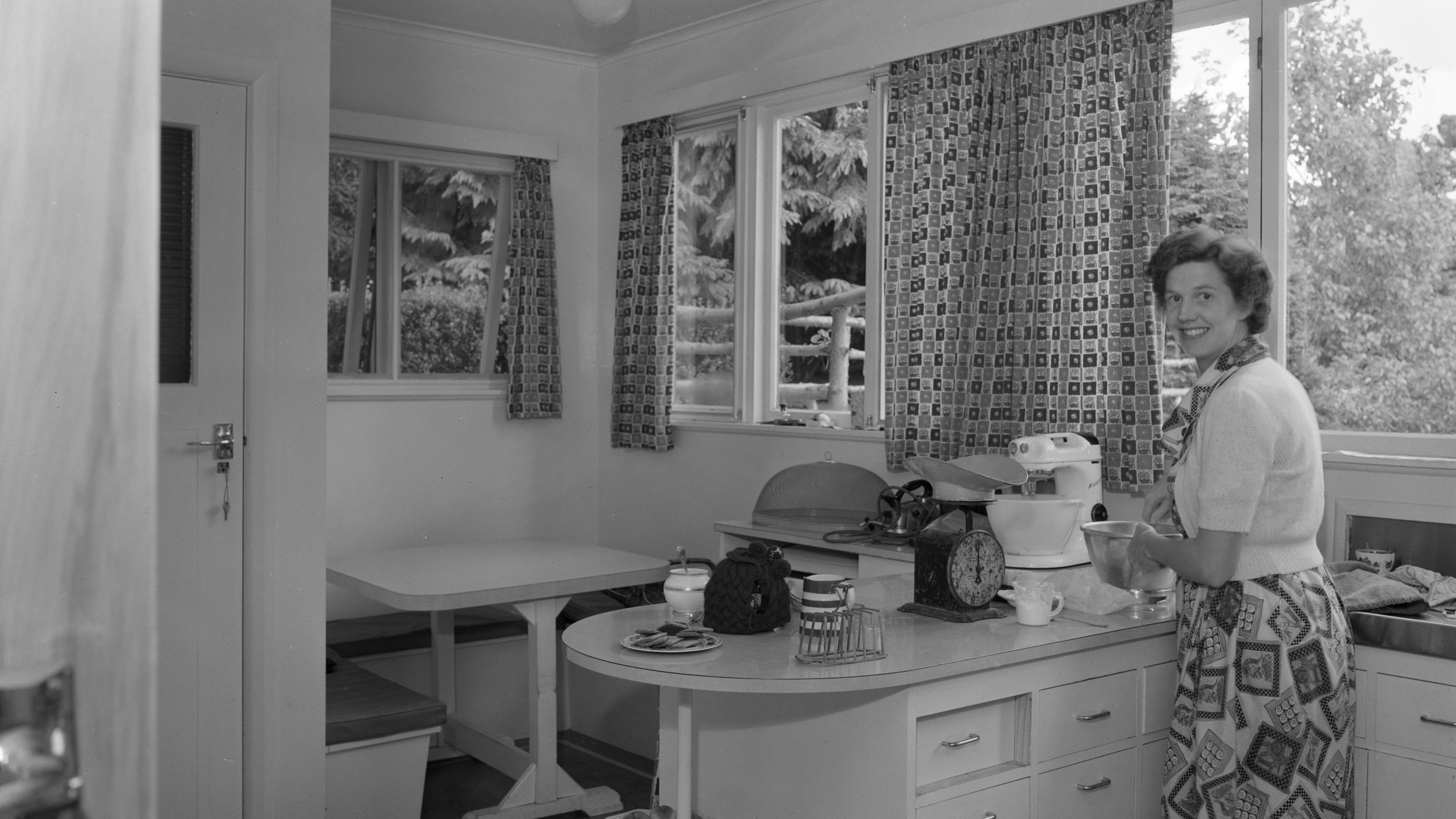Tradwives Do Not Stand Against Neoliberalism, But They Are Not The Problem
Alena Kate Pettitt, tradwife and blogger for The Darling Academy. Photograph: The Darling Academy
Since 2020, tradwives have popped up over various social media platforms. A neologism for ‘traditional wife,’ they are a niche subculture of women who choose to embody a ‘traditional lifestyle,’ with clearly defined gender roles associated with patriarchal, heteronormative, nuclear family units.
By Natalie Sherriff
The fantasy of the nuclear family has typically consisted of a father who participates within the labour market and a mother who concerns herself with home production or child-care duties. Whilst the traditional family has declined in recent decades in the United Kingdom and the United States, the emergence of tradwives has sparked debate, and not least amongst feminists.
Some feminists believe that this return to traditional gender roles signals the political repression of women's rights. These feminists worry about tradwives’ focusing solely on home production and express concern over them giving up financial independence; whilst those who support the tradwive lifestyle contend that these feminists are manufacturing unnecessary outrage. In my opinion, each of these views are warranted.
The Disillusionment with the Girlboss
Girlboss feminism told women that if they replicated mens’ participation within the labour market, or more specifically the corporate world, they could become empowered women. However, girlboss feminism is just another neoliberal falsehood; women typically heralded as ‘girlbosses’ for success in their corporate enterprises, marketability and for breaking ‘glass-ceilings’ have frequently omitted their social, economic or political privileges. This meant that genuinely telling every single woman that they could become a ‘girlboss’ was quickly proven impossible when factoring in intersectionality.
In the West, many young people have been robbed of opportunities to establish themselves in their desired careers, go to university, achieve financial security, access property ladders, have disposable income and receive accessible healthcare. Recently, it was revealed that women’s private pensions are worth 35% less than their male counterparts in the United Kingdom, illustrating just how difficult it is to girlboss yourself to the top.
On TikTok, a tradwife who goes by the title ‘gwenthemilkmaid’ perfectly encapsulates this apparent dissatisfaction with the girlboss mentality. In one video, she is seen stating: “women submit to their bosses and no one bats an eye. But the moment a wife submits to her husband, it's oppression or slavery.” In another video, she claims: “I don't want to be a girlboss. I want to be a farm momma, who bakes bread, milks cows and frolics barefoot in the garden.” These statements, somewhat unintentionally anti-capitalist, reveal tradwives as a subset of women who truly feel misaligned with the nine-to-five girlboss, or what has been recently rebranded as the ‘corporate girly’ aesthetic.
The Fashioning of Fascism
Cynthia Loewen, tradwife and Canadian beauty pageant titleholder. Photograph: Instagram
Tradwives often present themselves with hair, makeup and vintage dresses reminiscent of the 1950’s. In doing so, they evoke a symbolic yearning for the social and political fabric of this time, which is not accidental.
Scholars Jack Bratich and Sarah Banet-Weiser contend that neoliberalism, with its policies founded on free trade, globalisation and privatisation, has routinely failed to provide political subjects with the security and liberation it once promised. Consequently, when individuals or groups feel politically or socially misaligned with neoliberal rationalities, it is inevitable that they will seek a sense of identity, belonging or community elsewhere. In my opinion, it's easy to see why tradwives romanticise the 1950’s — it is a reactionary movement dressed up in pastels and vintage aesthetics. Tradwives' desire to return to all things ultra-traditional, signifies a deep disillusionment with the current economic, political and social landscapes we find ourselves in.
However, I believe that the emergence of tradwives also signal towards a society increasingly befalling to right-wing propaganda. Tradwives apparent glorification of the 1950’s traditional family unit where women can stay at home sounds great, until you realise that this was a time wherein marital rape was legal, abortion was illegal and many women could not open their own bank accounts. The current-day tradwife aesthetic online harks back to a past that was engulfed in gender, sexual and racial oppression.
One of the signifiers of a rise in right-wing propaganda is an increasing public desire to return to a gendered, nuclear family unit, since this lifestyle normalises and permits hierarchy. In his book, ‘How Fascism Works’, American writer Jason Stanley states: “by representing the nation’s past as one with a patriarchal family structure, fascist politics connects nostalgia to a central organising hierarchical authoritarian structure, one that finds its purest representation in these norms.”
Who Can Join?
“Tradwives clearly illustrate a dissatisfaction with neoliberalism. However, instead of reimagining or advocating for a better system, they are duped into right-wing ideologies that push for traditional lifestyles and conservatism as an answer.”
Things take another sinister turn when we consider how tradwives have been criticised for their connections to white nationalism and alt-right movements. Earlier this year, British journalist and activist Ash Sarkar brought to light the various ways in which tradwives can be found masquerading behind pastel-aesthetics to evade the detection of their own white supremacy. Indeed, one tradwife called ‘Wife With a Purpose’ went offline after backlash from a video she uploaded to YouTube that was deemed overtly racist and supportive of neo-eugenics.
Although, I do not believe that all tradwives are raging bigots, it would be a mistake to believe that tradwives are not involved in constructions of race. In my opinion, one of the clearest ways that tradwives uphold white supremacy is through pushing the narrative that gendered divisions of labor are ‘biologically innate’. The notion of ‘naturalised’ domesticity erases an entire history of women who were not just ‘housewives’.
The narrative that all women have historically been confined to the home is a misconception that Black feminists dismantled. Sojourner Truth, Kimberlee Crenshaw, and Bell Hooks are just a handful of Black women who have documented how they, unlike their white counterparts, have had their gender roles, family and distribution of labour defined by segregation, financial insecurity, the threat of violence and mass incarceration.
Tradwives who seek to erase these histories maintain white supremacy. In seeking political legitimacy, tradwives routinely partake in what Jason Stanley frames as the "invention of a glorious past [that] includes the erasure of inconvenient realities.”
Manufactured Outrage
Tradwives clearly illustrate a dissatisfaction with neoliberalism. However, instead of reimagining or advocating for a better system, they are duped into right-wing ideologies that push for traditional lifestyles and conservatism as an answer. Many feminists have criticised tradwives for encouraging women to give up their financial independence, as it has been proved that a lack of access to economic resources results in women staying in abusive relationships for longer, and that being financially dependent on a partner increases the risk of women experiencing abuse.
However, tradwives remind us that we need to be advocating for a system that supports everyone. Is it really surprising that women might see financial support from a partner as attractive, given the current bleak economic landscape?
In the United Kingdom, decades of austerity, the cost of living crisis, and a high demand for housing, coupled with the Covid-19 pandemic, have highlighted pervasive gender inequalities. So, whilst feminists are right to express concerns over tradwives, it would be helpful not to fall into the trap of advocating for lifestyles that embody the same neoliberal rationalities that tradwives have attempted to distance themselves from.
It is also a privilege to sit and advocate for financial independence for all women in a time where so few are able to make ends meet independently or have their choices constrained by systemic oppression. Advocating for financial independence abandons women for whom this is not possible; disabled women, chronically ill women, those suffering from mental health conditions or those who have prior criminal convictions, which can automatically disbar entry into the workforce.
I believe that we ought to be careful not to succumb to manufacturing outrage, as this is often a diversion tactic from the political right which attempts to divide women further. Women choosing to be homemakers over participating in the labour market are not the issue — right wing propaganda sold via the tradwife lifestyle is.


















